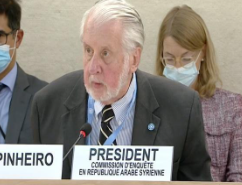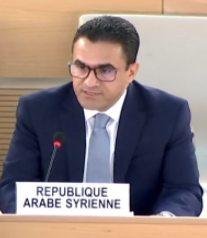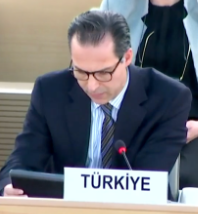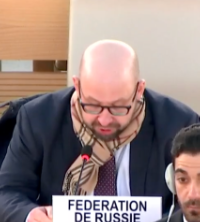52nd Session of the Human Rights Council
27th February – 31st March 2023
Agenda Item 4 - Interactive Dialogue on Oral Update of Commission of Inquiry on Syrian Arab Republic
21st March 2023
By Sarah Tayara / GICJ
Executive Summary
On the 21st of March 2023, at the 52nd Regular Session of the Human Rights Council, the Commission of Inquiry on Syria held an Interactive Dialogue to deliver an oral update on the human rights situation in Syria.
After more than a decade of conflict, the people of Syria are living in a human rights tragedy. With humanitarian needs at their peak, escalating violence, food insecurity and a series of earthquakes which have further crippled the country, Syrians are staring into an abyss of unimaginable pain and suffering.
Syrians face increasing and intolerable hardships, living among the ruins of this lengthy conflict. Millions are suffering in displacement camps, resources are becoming scarcer and donor fatigue is rising.
Mr Paulo Sergio Pinheiro, Chair of the Commission, began by highlighting that Syria has entered its 13th year of crisis. He lamented the outcome of the devastating earthquakes which struck Türkiye and Syria, noting the Syrian State’s exploitation of the disaster by delaying and blocking aid rather than facilitating it. He further expressed his disappointment in the United Nations and international community’s slow response to the disaster, noting how Syrians feel abandoned and betrayed. Mr Pinheiro continued by reminding the Council that detention and related violations by State security forces were among the underlying root causes of the Syrian conflict. He highlighted that 12 years on, arbitrary arrests and torture, enforced disappearances, and deaths in detention continued.
More than 12 years on from the beginning of the conflict, the war is far from over. Armed conflict is only one aspect of the hardships that Syrian civilians are facing. More than 13 million people have been displaced from their homes since March 2011. At least 300,000 have been killed. 14.6 million Syrians are dependent on humanitarian assistance. At least 150,000 are arbitrarily detained or forcibly disappeared at any time, and 90% of the country lives below the poverty line.
In keeping with Syria’s rejection of the Commission’s mandate since its establishment in 2011, the Syrian delegate rejected the report, insisting that it is a platform aimed at shaming the Syrian government and smearing it with unfounded allegations. He reiterated that the report contained prefabricated accusations which propagated a politicised agenda against Syria aimed at undermining its territorial integrity. The delegates of Iran and Russia concurred with Syria’s statement and criticised the Commission’s encroachment on Syria’s sovereignty. Other delegations firmly condemned the ongoing violations committed against civilians by the Syrian authorities and other actors involved in the conflict.
Geneva International Centre for Justice (GICJ) welcomes the Commission’s update and condemns the abuse and suffering the people of Syria have endured for so long. GICJ urges all parties in the conflict to immediately cease all acts of violence against civilians. We are particularly concerned by the rise in arbitrary detentions and the deliberate withholding of information from family members on the whereabouts of their loved ones. Additionally, we call for the immediate cessation of blanket internment of children in the al-Hawl camp.
After a decade of the world observing the suffering of the Syrian people from a distance, it is imperative that states make a real commitment to strengthen mechanisms of accountability and hold all parties in the conflict accountable for infringing upon the basic human rights of the Syrian people. Maintaining the status quo is no longer an option. The time has come to finally put the interests of the Syrian people above the agendas of the parties in the conflict.
Background
In March 2011, Syrians peacefully took to the streets, calling for greater freedom and dignity following years of human rights abuses. The Syrian government swiftly opened fire on peaceful protestors, meeting their calls for justice with brutal repression. As the 13th year of the conflict looms, the human rights situation remains bleak. More than 13 million people have been displaced from their homes and at least 300,000 people have been killed, with the actuall number unknown and likely much higher. 90% of the country is living below the poverty line. Since 2011, the Commission of Inquiry on Syria, established by the Human Rights Council Resolution S-17/1, has produced 27 UN mandated reports documenting grave violations of the most fundamental human rights in the country. In its reports, the Commission relies on witness interviews, photographs, videos, and satellite imagery. However, its efforts to carry out a full investigation remain curtailed by the Syrian government denying the Commission access to the country.
Report Summary
The report, based on investigations between 1st July 2022 and 31st December 2022, highlights the devastating human rights situation in the country. In line with previous years, the report identified the Syrian government as the country’s main perpetrator of human rights abuses. Violations documented were wide ranging and siege tactics are still being used by pro-government forces against civilians. Horrific conditions in displacement camps in the north-west have forced many to return to their homes in frontline areas, exposing them to a high risk of death due to active hostilities and indiscriminate civilian attacks. The Commission also highlighted that the weaponisation of humanitarian aid is being used as a tactic of war, with pro-government forces blocking humanitarian aid from accessing civilians most in need.
Moreover, indiscriminate violence against civilians persists in the country. The report highlights the culpability of several parties to the conflict, including Hay’at Tahrir Al-sham (HTS), the Turkish Occupying Forces, the Syrian Democratic Forces and the Syrian National Army. Reflecting on the tragedy of the Syrian conflict in general, many children have been forced to bear the brunt of the attacks. The report also highlighted that torture and ill-treatment in detention centres operated by Syrian intelligence remained systematic. Across Syria, hundreds of thousands of civilians are unlawfully held in detention centres, forced to endure torture and inhumane and degrading treatment. The Syrian government also consistently fails to inform family members of the fate of their loved ones, relying on tactics of fear as a means to further repress the population. Sexual and gender-based violence is rife in areas of government control, with immunity being granted to government officials. Arbitrary detention as a means of punishment, as well as the crime of rape and other forms of sexual violence, have also been relied upon by HTS and the so called Syrian National Army (SNA) in the north of the country.
The report also shed light on the worsening conditions for 56,000 people, of which 37,000 are children, in al-Hawl and al-Rawj displacement camps. Children and women experience daily violence, exploitation and abuse in conditions amounting to torture and inhumane or degrading treatment. With escalating murders and deadly clashes occurring in the camp, everyday survival is a struggle. The report welcomed the recent increase in repatriation operations of those held in the camp, including in countries previously reluctant to repatriate adults; however, they urged speedier repatriation of more individuals.
Furthermore, apart from some notable convictions in criminal proceedings in Europe, the Commission condemned the lack of comprehensive accountability for serious human rights violations and war crimes committed by the Syrian Government, armed groups, listed terrorist groups and foreign powers.
The report recommended the immediate cessation of all attacks on civilians as well as an independent, impartial, and credible investigation into civilian casualties to establish a system of accountability and non-repetition for perpetrators of crimes. Moreover, in light of the deteriorating living conditions, the Commission has called for a review of the sanctions currently imposed on Syria. Despite humanitarian exemptions, the report finds that more is required to mitigate unintended consequences on the daily lives of the civilian population brought about by over compliance. Additionally, the Commission called for an immediate end to all torture and other cruel, inhumane, or degrading treatment in detention centres as well as the implementation of all feasible measures in line with UNSCR Resolution 24/74 to locate all those arbitrarily detained. Importantly, it asserted that nothing less than a political solution brought about by a long-lasting, nationwide ceasefire will suffice.
Interactive Dialogue
Chair of the Commission - Mr Paulo Sergio Pinheiro
 Mr Pinheiro, Chair of the Commission, highlighted that Syria has entered its 13th year of ongoing conflict. He lamented the outcome of the devastating earthquakes which struck Türkiye and Syria and criticised the Syrian government’s exploitation of the disaster by delaying and blocking aid rather than facilitating it. He further expressed his disappointment in the United Nations and international community’s slow response to the disaster, noting how Syrians feel abandoned and betrayed. Mr Pinheiro acknowledged the myriad of heroic acts which saved victims from under the rubble, as well as the heightened acts of generosity and solidarity from various actors. However, he shed light on the politicisation of humanitarian aid, particularly by the Syrian government and designated terrorist group HTS, which exploited the situation for their own political gain.
Mr Pinheiro, Chair of the Commission, highlighted that Syria has entered its 13th year of ongoing conflict. He lamented the outcome of the devastating earthquakes which struck Türkiye and Syria and criticised the Syrian government’s exploitation of the disaster by delaying and blocking aid rather than facilitating it. He further expressed his disappointment in the United Nations and international community’s slow response to the disaster, noting how Syrians feel abandoned and betrayed. Mr Pinheiro acknowledged the myriad of heroic acts which saved victims from under the rubble, as well as the heightened acts of generosity and solidarity from various actors. However, he shed light on the politicisation of humanitarian aid, particularly by the Syrian government and designated terrorist group HTS, which exploited the situation for their own political gain.
Mr Pinheiro highlighted that the Commission is looking into the various reports of impediments to humanitarian assistance, looting of vacated homes and recent Israeli airstrikes on Aleppo airport, a conduit for humanitarian aid. He urged all parties to cease all hostilities immediately and to consent to the delivery of humanitarian assistance to those in need through cross-border and crossline routes.
Mr Pinheiro commended the United States, the European Union and the United Kingdom’s relaxation of sanctions, as well as the Syrian government’s consent to an additional humanitarian border crossing. He expressed the Commission’s hope that both actions extend beyond 3 months. He also supported the call of many Syrians for a review of the effectiveness of the UN’s and wider international community’s humanitarian response to the disaster to ensure failures are not repeated.
Mr Pinheiro continued by noting that the tragedy of the earthquake only added to the calamities in Syria. He mentioned the persisting hostilities against civilians in the north-west, which may amount to war crimes. Mr Pinheiro shed light on the Syrian government’s continuing targeting of civilian areas through tactics of cluster bombings in Idlib, and rocket attack on a busy market area in Northern Aleppo in which at least 45 civilians were. Airstrikes by Russian forces were also launched against Syrians, further exacerbating the deaths and injury of civilians.
Mr Pinheiro lamented the 12 years of conflict, which resulted in the deaths of at least 300,000 civilians, the displacement of more than half of the pre-war population and the destruction of the country’s cities and infrastructure. He discussed the heinous violations of human rights by the Syrian government, which were the root causes of the conflict. 12 years on from the beginning of the conflict, arbitrary detention, unlawful arrests, enforced disappearances, torture, ill-treatment and deaths in detention by the Syrian government all continue with appalling regularity.
He then Pinheiro moved on to recognise the violations of other parties in the conflict. Mr Pinheiro noted continuing allegations of enforced disappearances and executions by HTS. Members of the SNA also committed grave acts of torture, including sexual violence and ill-treatment in detention facilities under their control, with children being amongst the victims of their actions.
Mr Pinheiro continued by condemning the inhumane practices of torture and ill-treatment of those forcibly disappeared and arbitrarily detained, as well as the dire situation of 56,000 detainees, mostly women and children, in the Al-Hol and Al-Rawj camps, which are kept in conditions amounting to cruel and inhuman treatment and war crimes of outrage against personal dignity. He called upon States to repatriate their civilians held in these camps with utmost speed. He also sheds light on the extent of sexual and gender-based violence, particularly against women, which permeates their everyday lives.
Finally, Mr Pinheiro concluded by noting the Commission’s long support for an international, independent entity to search for those missing and disappeared, as well as the Secretary General’s call for establishing such an entity. He implored the UN General Assembly to move away from a general discussion of the entity to urgently passing a resolution establishing it.
Syria
Mr Haydar Ali Ahmad, the representative of Syria, began by renewing Syria’s rejection of the Commission’s mandate and its biased reports. He accused the Commission of prefabricated allegations which overlooked the root causes of the crisis. Mr Ahmad reiterated Syria’s efforts to restore and consolidate security and stability in the country and stated that the Commission’s report was immoral in its use of ‘false witnesses and fabricated evidence’. He accused the Commission of deliberately ignoring the acts of terrorist groups within Syria, which the Syrian delegate stated are the only party, along with the States which support them, responsible for war crimes in the country. He further asserted that the Commission manipulated the principles of human rights and the protection of civilians in order to interfere with the internal affairs of Syria. Such an approach was particularly evident in the Commission’s exploitation of the recent earthquake and its obscurement of the Syrian government’s effort to secure aid. He continued by pointing to the Universal Coercive Measures as the main obstruction to humanitarian assistance to civilians.
the Commission’s mandate and its biased reports. He accused the Commission of prefabricated allegations which overlooked the root causes of the crisis. Mr Ahmad reiterated Syria’s efforts to restore and consolidate security and stability in the country and stated that the Commission’s report was immoral in its use of ‘false witnesses and fabricated evidence’. He accused the Commission of deliberately ignoring the acts of terrorist groups within Syria, which the Syrian delegate stated are the only party, along with the States which support them, responsible for war crimes in the country. He further asserted that the Commission manipulated the principles of human rights and the protection of civilians in order to interfere with the internal affairs of Syria. Such an approach was particularly evident in the Commission’s exploitation of the recent earthquake and its obscurement of the Syrian government’s effort to secure aid. He continued by pointing to the Universal Coercive Measures as the main obstruction to humanitarian assistance to civilians.
Finally, he finished by affirming that the Syrian government is ready to cooperate with those with sincere intentions to improve the humanitarian situation in Syria. The representative renewed his call for the Council to end the Commission’s politicised mandate, which lacks credibility and objectivity, and to stop their support for armed terrorist groups which pose a threat to Syria’s national sovereignty and territorial integrity.
Condemning the Syrian Government
Many States then took the floor to express their views on the Commission’s update and put questions before Mr Pinheiro and members of the Commission: Mr Hanny Megally and Ms Lynn Welchman.
 The representative of the European Union began by highlighting the EU’s continued support of the Commission. She condemned the persistent and systematic violation of human rights and humanitarian law by all parties in the conflict, particularly by the Syrian regime and its allies. The representative reiterated the EU’s commitment to fighting impunity through mechanisms such as the International, Impartial, Independent Mechanism (IIIM) and reporting cases to the International Criminal Court. She noted that Syria is not a safe place to return to, highlighting the EU’s concern regarding social and demographic engineering in the country. She concluded by pointing to the recent earthquakes to ensure that humanitarian assistance reaches all intended recipients.
The representative of the European Union began by highlighting the EU’s continued support of the Commission. She condemned the persistent and systematic violation of human rights and humanitarian law by all parties in the conflict, particularly by the Syrian regime and its allies. The representative reiterated the EU’s commitment to fighting impunity through mechanisms such as the International, Impartial, Independent Mechanism (IIIM) and reporting cases to the International Criminal Court. She noted that Syria is not a safe place to return to, highlighting the EU’s concern regarding social and demographic engineering in the country. She concluded by pointing to the recent earthquakes to ensure that humanitarian assistance reaches all intended recipients.
The representative of Norway delivered a statement on behalf of the Nordic-Baltic Countries. The representative expressed firm support for the work of the Commission. She lamented the pattern of human rights abuses and crimes against humanity committed by the Syrian government and its allies, such as Russia. The representative joined the Commission in urging all countries parties in the conflict to provide full, unhindered humanitarian access to Syria, particularly following the recent earthquake.
The delegate of Qatar condemned the Syrian regime’s deliberate use of enforced disappearances and arbitrary detentions as a weapon of war. She deplored the deliberate targeting of women and children and noted that the absence of a political process supported instability and insecurity in the country. In support of the Secretary-General, she called for an enquiry to determine the fate of thousands of disappeared persons, urging the international community to put more pressure on the Syrian government to put an end to impunity and the establishment of a political solution in line with Security Council Resolution 22/54.
The representatives of Germany, the United Kingdom, France aligned themselves with the statement made by the EU. They reiterated that Syrians are being subjected to a staggering level of displacement and humanitarian needs. The country is nowhere near safe and the recent earthquakes have exacerbated an already dire situation. They renewed their call for a nationwide ceasefire and permission for the delivery of aid through all modalities. The representatives reiterated their call for a UN facilitated political solutions to the crisis in line with Security Council Resolution 22/54. They also called for an independent and impartial mechanism to bring about accountability for enforced disappearance and arbitrary detentions.
The representative of Turkey highlighted that the earthquake not only deepened the humanitarian crisis but also reminded the international community of the need for a political solution. He noted, however, that the report omitted deliberate attacks against civilians committed by PKK, YPG and SDF terrorist group organisations, and urged the Commission to maintain consistency and professionalism in its approach towards fulfilling its mandate.
humanitarian crisis but also reminded the international community of the need for a political solution. He noted, however, that the report omitted deliberate attacks against civilians committed by PKK, YPG and SDF terrorist group organisations, and urged the Commission to maintain consistency and professionalism in its approach towards fulfilling its mandate.
Criticising the Commission’s Politicised Agenda
Some States criticised the Commission, accusing it of pursuing a politicised agenda aimed at manipulating the Human Rights Council. They highlighted that UNSCR 46/22, which established the Commission, had not actually been supported by Syria as the concerned country, hence rendering its findings unacceptable and biased.
 The representative of Russia noted with regret the lack of improvement in the human rights situation in Syria. He deplored the international community’s leadership, including that of the United Nations, failure to acknowledge Damascus’ complaints of the violation of the United Nations Charter and international law through the West’s looting of Syria’s natural resources. He condemned the Commission for smearing Syria’s legitimate government and criticised the
The representative of Russia noted with regret the lack of improvement in the human rights situation in Syria. He deplored the international community’s leadership, including that of the United Nations, failure to acknowledge Damascus’ complaints of the violation of the United Nations Charter and international law through the West’s looting of Syria’s natural resources. He condemned the Commission for smearing Syria’s legitimate government and criticised the
Unilateral Coercive Measures (UCM) imposed on Syria by Western countries to serve their geopolitical interests. The representative concluded by asserting that the stabilisation of Syria is only possible through the restoration of its sovereignty, independence, unity, and territorial integrity.
The representative of Iran criticised the report’s lack of objectivity and balance in its approach. He condemned the report's failure to shed light on the war crimes and human rights violations by the occupiers and terrorists in the country. He further criticised the report for not reflecting the effect of UCM’s on the humanitarian situation in the country. The representative finished by highlighting Israel’s continued aggression against Syria, even through the earthquake.
Civil society representatives
The overwhelming stances of NGOs were clear and homogenous. The culpability of the Syrian authorities in the persisting human rights violations of the Syrian people is undeniable. Civil society organisations called for the imposition of international sanctions on armed groups and parties proven to be involved in human rights violations. The civil society organisations called for the establishment of an IIM to locate those missing. Moreover, they explored the deplorable situation of women’s and child rights, highlighting that their vulnerability often means that they are disproportionately impacted by the harsh realities of war.
Resolution adopted
On the 4th April, the Council voted on two Resolutions concering the Syrian Arab Repubic. The first Resolution to be adopted was Resolution A/HRC/52/L.16 by a vote of 26 in favour, 5 against and 16 abstentions in which it decided to extend the mandate of the Commission of Inquiry on the Syrian Arab Republic for one year. The second was Resolution A/HRC/52/L.31 by a vote of 31 in favour, 14 against and 2 abstentions. This resolution extended the consideration of human rights violations agaisnt Syrian in the Israeli occupied Syrian Golan and deplored the presence of and all practices by the Israeli State against Syrians in the area. This included continued settlement policies, engineered demographic change and detention of Syrian civilians.
GICJ Position
Geneva International Centre for Justice (GICJ) welcomes the Commission’s update and welcomes the extension of it. We condemn the abuse and suffering the people of Syria and mourn the hundreds of thousands of lives that have been lost and the millions which have been destroyed in the Syrian conflict. GICJ urges all parties in the conflict to immediately cease all acts of violence against civilians. We join the Commission in calling upon an immediate end to inhumane treatment and torture in detention centres, including sexual and gender-based violence, as well as an immediate release of all arbitrarily detained civilians. We also call upon the immediate cessation of all arbitrary internment of children in al-Hawl camp. In a war which has inflicted unbelievable pain on children, blanket internment represents yet another way in which children have been forced to bear the brunt of the Syrian conflict.
GICJ calls for an immediate end to inhumane treatment and torture in detention centres, including sexual and gender-based violence, as well as an immediate release of all arbitrarily detained civilians. Moreover, we implore the international community to truly commit to putting an end to the ongoing injustice via the implementation of mechanisms of accountability and the opening of further borders for aid delivery. It is vital that the international community does not stop the Assad regime’s approval to provide lifesaving aid to the people of Syria, who need us now more than ever. In line with the Council, we demand that Israel immediately withdraws from the occupied Syrian Golan and ceases all repressive measures against Syrian citizens within it.
After a decade of the world observing Syrian suffering from afar, we implore the international community to truly commit, beyond mere words, to put an end to the injustice via the implementation of mechanisms of accountability and the opening of further borders for aid delivery. The situation in Syria for the past 12 years has been nothing short of a humanitarian tragedy. For the first time in the history of the conflict, let us finally put the interests of the Syrian people above the agendas of the parties in the conflict. Let us act now before it is too late.
International Humanitarian Law, Geneva International Centre for Justice, GICJ, Justice, Syria, Commission of Inquiry Syria, Human Rights, Human Rights Council, HRC52, Syrian Conflict, Syrian War, Syrian Suffering, Geneva4Justice, Israeli Occupation












